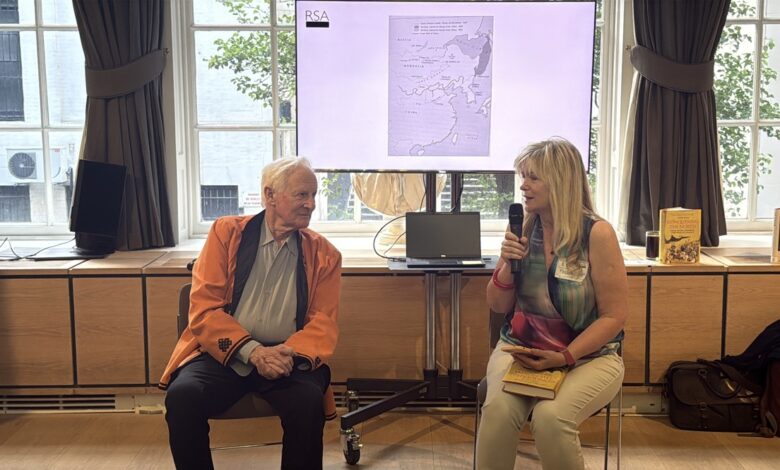
Paradigm Shift: where North and South meet
With John Man and Eva Pascoe
by Irina Shtreis
Launched at the Royal Society Of Arts on 12th May 2025, John Man’s new book, Conquering the North: China, Russia, Mongolia: 2,000 Years of Conflict, explains why we should watch China and remember the Khalkhin Gol battle.
The formidable presence of China in the geopolitical arena has provided food for thought for scholars, writers and journalists all over the world. The most recent book by historian John Man looks into China’s expansive strategy and long-lasting claim on the territory of its northern neighbours. Conquering the North. China, Russia, Mongolia: 2,000 Years of Conflict presents an impressive scope of events that led to this tension, from geological to historical.
The book begins with the introduction of Ordos — a pivotal point on the borderlands — as well as its murky silt-fed Yellow River. The shape of the river reminds of the Chinese character ji 几 (translating as “how much”), Man writes, which seems to explain why for centuries this area has been viewed as inherently “Chinese”. Yet, of course, as we learn from the next chapters, this viewpoint of China comes as a perverted one.
Now part of what is called the Inner Mongolia Autonomous Region (one of the five autonomous regions of China), Ordos was the cradle for future nomads. The nomadic lifestyle was later juxtaposed with the grounded farmers and urban residents. The same juxtaposition can be found in the contemporary world, with digital nomads escaping the neoliberal confines of the nine-to-five. The original nomads, however, spread beyond the borderlands of China and reached the edges of Europe approaching the Black Sea. They were called Scythians after Scythes the son of Hercules, the only being able “to bend and string his father’s bow”.
The area that happened to be an immense source of coal and other natural resources has inevitably been controlled by China whose insatiable hunger (in economic terms) is one of the key subjects of the book. “China needs Mongolian resources and also Russian resources”, John Man puts it succinctly. “Mongolia needs to sell its minerals and so needs Russia. These territories are seen by China as rightfully Chinese in historical terms. So, that’s pretty much the theme of the book”.
John Man’s interest in Mongolia arose when he was a student at Oxford. While studying history and Mongolian in the late 1960s, the future writer was haunted by an idea to travel far and wide and explore the mysterious region. “I did Mongolian as a post-grad because I thought I was going on an expedition there”, John Man tells Eva Pascoe at their fireside chat at RSA book launch at London Fellowship event. “It was a crazy idea that never happened. It was an unfulfilled ambition”.
Still, thirty years later, Mongolia reciprocated. After the collapse of the Soviet Union, Man, an established travel writer and historian, visited the country of his dreams. Travelling back and forth, the historian collected materials that fed into a series of books focusing on Central Asia and its famous rulers: Gobi: Tracking the Desert, Genghis Khan: Life, Death and Resurrection, Attila: The Barbarian King Who Challenged Rome and Kublai Khan: The Mongol King Who Remade China.
Zooming out to the prehistoric times, Conquering the North. China, Russia, Mongolia: 2,000 Years of Conflict starts from the formation of what is known these days as the Eurasia continent. The narrative quickly moves on to the formation of three empires — “one of farmers and cities, the core of today’s nation” (China), “the other of nomadic herders on the northern grasslands” (Mongolia) and the borderland empire, who “survived by settling down and adopting Chinese culture”.
The pivotal conflicts of ancient and modern history are meticulously described in the book. One such is the Battle of Khalkhin Gol which was ignited on the Soviet-Japanese border when, in 1931, Japan took over Manchuria (present-day northeast China and parts of the modern-day Russian Far East) to build an empire on the mainland. The ultimate agenda was to take over North China, Mongolia, and Siberia, move through Siberia and meet with German allies at the Urals. Russia and Mongolia saw that was going to happen and were determined to prevent this plan of action.
“The most important battle that you’ve never heard of. Very few people indeed appreciated its significance here”, John Man points out. “Imagine what would have happened if the Japanese had not lost, they would have gotten into Siberia and the rest of the world would be very different. As it was, they were chased off Manchuria and were left with no alternative but to turn on Pearl Harbour. If that battle had not been won by the Russians and the Mongolians, there would have been no Pearl Harbour and the whole history of the world would have been very different. It’s well worth knowing about this battle. Most extraordinary thing”.




